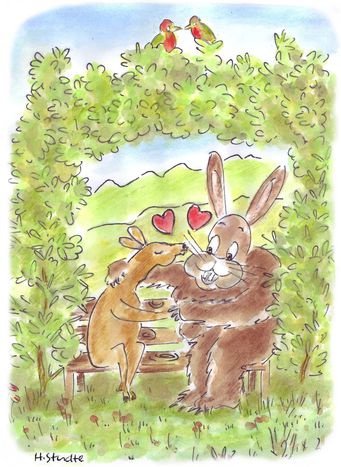
I love you my dropping
Published on
Translation by:
Lydia BigosMy bunny-bear, baby, cabbage, sugar slug - just like Europe, love knows no boundaries. Yet some terms of affection for loved ones vary from being rather unsavoury to overly sickly on the continent – romantic sayings of the week, with audio
Many languages use words that are associated with sweets to show their affection. The Brits call their loved ones honey , whilst the Poles say cukiereczek (sweetie). The French and Belgians express their affection by calling someone chou
, whilst the Poles say cukiereczek (sweetie). The French and Belgians express their affection by calling someone chou , which refers to chou à la crème, a pastry - not cabbage (which the word also means), as many people seem to believe in this context! They also call their affectionate ones ma crotte
, which refers to chou à la crème, a pastry - not cabbage (which the word also means), as many people seem to believe in this context! They also call their affectionate ones ma crotte which means chocolate - not dropping, another false friend.
which means chocolate - not dropping, another false friend.
With the German Zuckerschnecke (my sugar slug) we move into a world of animals, which includes the French ma biche
(my sugar slug) we move into a world of animals, which includes the French ma biche (my doe) and ma poule
(my doe) and ma poule (my chicken). German speakers in Europe create cross species of animals when they coo Hasibär
(my chicken). German speakers in Europe create cross species of animals when they coo Hasibär (my bunny-bear) at their sweethearts. Another popular expression is the long, schmaltzy Schaaaaaaaaatz
(my bunny-bear) at their sweethearts. Another popular expression is the long, schmaltzy Schaaaaaaaaatz (dear).
(dear).
Rosy French speakers also call their loved ones their flowers (ma fleur). However, Italians look for inspiration in the kitchen, where they have taken the cetriolino (my gherkin) or zucchina
(my gherkin) or zucchina (my little courgette. *Disclaimer - we are afraid these terms might just be used by our very own Italan editor, and not represent the Italian population! - ed). The British tend to use the word pumpkin
(my little courgette. *Disclaimer - we are afraid these terms might just be used by our very own Italan editor, and not represent the Italian population! - ed). The British tend to use the word pumpkin , mostly when they talk to littler people. Some of the affectionate words used in languages are truly surprising. It is difficult to believe that someone likes to be called my little fatty (such as in Spain, mi gordito
, mostly when they talk to littler people. Some of the affectionate words used in languages are truly surprising. It is difficult to believe that someone likes to be called my little fatty (such as in Spain, mi gordito ). Even odder than this is that you can call your girl mama or your man daddy
). Even odder than this is that you can call your girl mama or your man daddy (common terms in Latin Spanish, mamita
(common terms in Latin Spanish, mamita and papito). Universally though, the term baby
and papito). Universally though, the term baby , arguably with the influence of American English, has come to mean much much more than a newborn or a little'un.
, arguably with the influence of American English, has come to mean much much more than a newborn or a little'un.
Browse resident illustrator Henning Studte's website
Translated from Miłość niejedno ma imię…



